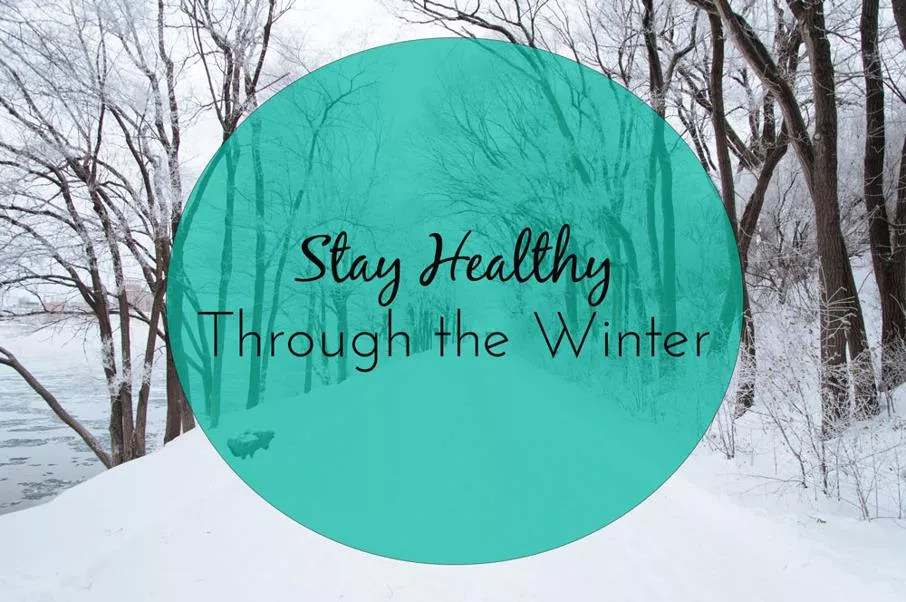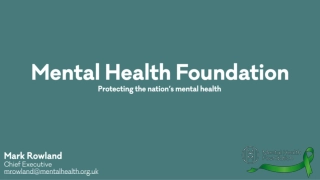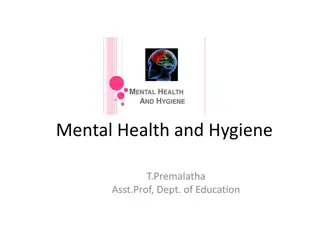Winter Mental Health: Tips for Maintaining Well-being
As winter approaches, it's essential to be mindful of our mental health. The changing seasons can impact our mood and energy levels. This article provides valuable insights on how to cope during the winter months, including tips on maximizing natural light exposure, connecting with others, and seeking additional support when needed.
Download Presentation

Please find below an Image/Link to download the presentation.
The content on the website is provided AS IS for your information and personal use only. It may not be sold, licensed, or shared on other websites without obtaining consent from the author. Download presentation by click this link. If you encounter any issues during the download, it is possible that the publisher has removed the file from their server.
E N D
Presentation Transcript
Agenda Thursday 18th November 2021 Time Company Colleague 12.30 12.35 pm Introductions Chair Elliot Evans 12.35 12.55 pm IMO (Inspire, Motivate Overcome) Charity LSCFT (Lancashire & South Cumbria NHS Foundation Trust) Mohammed T Sidat Director of Operations Kevin O Hara Partnership Development Manager 12.55 1.15 pm 1.15 1.35 pm Lancashire Fire & Rescue Service Kirsty McLoughlin - Prevention Support Officer (Live Safe) All 1.35 14.00 pm AOB / Any updates from other attendees are welcome 2
The winter months can be difficult for many of us and it can also affect our mental health. With dropping temperatures and shorter days, we might feel the need to sleep for longer, notice a change in appetite, or find that things we normally like to do become a struggle. Most of us are affected by seasons changing in some way, and it s normal to feel a bit sluggish during the winter. However, for some of us the effect on our mood and energy level can be much greater, impacting day to day life. As we continue through winter, it s good to think about the simple things we can do to look after our mental health, and how to spot the signs that we may need to alter our routines or obtain some additional support to help us feel better. 3
Make the most of natural light Spending time in green space or bringing nature into your everyday life can benefit both your mental and physical wellbeing. Involvement in things like growing food or flowers, exercising outdoors or being around animals can have lots of positive effects. Spending time walking among or simply looking at trees lowers blood pressure and reduces the stress- related hormones cortisol and adrenaline. https://www.mind.org.uk/information-support/tips- for-everyday-living/nature-and-mental- health/ideas-to-try-in-nature/ 4
Connecting with people As the days become colder/darker the last thing you feel like is to keep up with all the connections you have. Don t retreat into isolation because it s harder to get together with friends and family. Continue to safely see your network either virtually, through outdoor activities, or just a regular phone call. Isolation and loneliness can be devastating to your menta health at any age, so try to nurture your connections, even if your instinct is to hibernate. 1.Talk on the phone instead of video chat or text. 2.Meet friends outside for a walk 3.Is there an old hobby you used to enjoy that you could pick up again. 4.Look to see if there are classes either virtually or being held safely face to face if you need a kick-start. 5.Go to a coffee shop. Sometimes just being around people can help you feel connected, even if it s just a hello to other people in the caf when buying your drink. You can benefit from being around people, even if you don t want to have a conversation. 6.Use some of your time to volunteer for a cause you feel passionate about. You can offer your help on days that suit you, for a few days, few months or all year round. 5
Exercise Try to keep physically active during the winter. It can be difficult to get motivated when it s cold and dark, but doing at least 30 minutes moderate-intensity exercise most days of the week can help support your immune system to fight off the flu. It doesn t have to be anything particularly strenuous doing housework, gardening or going for a gentle walk, if you are able to can all help. The icy air may be cold at first but exercise gets your blood pumping, and you'll keep that heat long after you have finished. Studies have found that moderate levels of exercise can boost the immune system and improve your defences against winter coughs and colds. Although pushing yourself TOO hard during exercise can have the opposite effect, moderate and regular exercise is good for you. Exercise boosts your mood. Exercise endorphins really help when you're feeling down. Once you make it outside, you should get an extra dose of mood-elevating vitamin D also. If you don t want to go outside, look up a virtual exercise class, follow some exercise tips from google, clean out some cupboards or tidy the garden. 6
Encourage Your Creative Side If you re stuck inside, tap into your creativity. Benefits such as reduced stress, depression, and anxiety, a sense of accomplishment, increased confidence and self-esteem have been advised by involvement. Crafts are nice because they can be done alone or in a group. There s usually something for everyone everything from painting, scrapbooking, knitting, quilting, woodworking, jewellery making, and more. Arts and crafts are good for your mental health? Keep a journal - Journaling / Keeping a Diary can be good for your mental health. It provides a place to dump your feelings, process and reflect, and clear your head. Have a routine and set short-term goals - Planning for today, tomorrow, the next week. If you have big, difficult tasks on your plate try breaking them up into smaller, more manageable jobs. Get a winter Flu Vaccine / Covid Vaccine https://www.nhs.uk/conditions/coronavirus-covid-19/coronavirus-vaccination/coronavirus-vaccine/ https://www.nhs.uk/conditions/vaccinations/flu-influenza-vaccine/ 7
Find time for your needs - It can be easy to look after other people first at work or at home, or to fill a diary with commitments and activities that crowd out our own needs. Whether it s booking leave from work, shutting the bathroom door for a shower or bath away from the children, or getting out for a walk Alone, try and find something that works for you. Give yourself a reward - It s important to celebrate small wins, even if that s just in your head. A win could be clearing a work task or it could just be getting up and dressed. A hot chocolate after a walk outside, going to see a new movie, buying something cosy, a new book or even a moment of peace on the sofa are all small rewards. 8
Some foods to help boost your Brain Health Our brains function best when we eat a nutritious and balanced diet. High-quality foods that contain fatty acids, antioxidants, vitamins and minerals nourish the brain and protect it from oxidative stress (the waste produced when the body uses oxygen, which can damage brain cells) Fatty Fish One of the critical amino acids cannot be manufactured naturally from the body hence must be obtained from the diet. Oily fish provides omega -3 fats in EPA and HAD form. This oil contains the active form of EPA fats essential to the proper functioning of the heart and joints and most importantly the brain. Salmon and sardines are rich sources of these oils. Coffee Drinking coffee (in moderation) on a regular basis appears to enhance concentration and improve motor control and alertness by creating changes in the brain. Studies have found coffee drinkers had increased activity in parts of the brain consistent with an improved ability to focus. Olive oil is packed with good fats and phytonutrients that support your cognitive function and overall health, making it a staple in the kitchen of anyone looking to improve brain health Eggs are rich in B vitamins and a nutrient called choline which is associated with reducing inflammation and promoting brain function. Blueberries / Berries Blueberries contain a compound that has both anti-inflammatory and antioxidant effects. Tomatoes contain a powerful antioxidant known as lycopene. Lycopene protects the brain cells against radical damage. Water Stay hydrated. It s commonly recommended that you drink eight 8-ounce (237-mL) glasses of water per day It also keeps cells active and balances chemical processes in the brain. 9
Turmeric contains a chemical known as curcumin which is a natural and powerful anti-inflammatory agent. Turmeric is also an antioxidant that can help maintain a healthy immune system Broccoli Vitamin K is an essential brain food known to enhance the cognitive functioning of the brain and improves the brainpower. Broccoli is a primary source of this vitamin. Pumpkin seeds supply the brain with zinc, which is an essential brain booster mineral and improves thinking skills. Dark chocolate Cacao flavonoids seem to be good for the brain. They may encourage neuron and blood vessel growth in parts of the brain involved in memory and learning. They may also stimulate blood flow in the brain. Walnuts are rich in alpha-linolenic acid, a plant-based omega-3 fatty acid. Both omega-3 fatty acids and polyphenols are considered critical brain foods that may counteract oxidative stress and inflammation, which are advised as two drivers of cognitive decline. 10
Gut Health The incredible complexity of the gut and its importance to our overall health is a topic of increasing research in the medical community. Numerous studies in the past two decades have demonstrated links between gut health and the immune system, mood, mental health, autoimmune diseases, endocrine disorders, skin conditions, and cancer. Gut health refers to the balance of microorganisms that live in the digestive tract. Looking after the health of the gut and maintaining the right balance of these microorganisms is vital for physical and mental health, immunity, and more. Things you can do to increase your gut health: Lower your stress levels - Meditation, walking, getting a massage, spending time with friends or family, diffusing essential oils, laughing, yoga, or having a pet. Get enough sleep Some research has shown that gut health can play a role in how well someone sleeps, and sleep can affect how well the digestive system functions. Alter your diet - Reducing the amount of processed, high-sugar, and high-fat foods that you eat and eat more can contribute to better gut health Prebiotic/Probiotic - Adding a prebiotic or probiotic supplement to your diet or adding the following foods could help - garlic, legumes, beans, peas, oats, berries, bananas fermented foods (e.g. sauerkraut, kefir, miso) 11
Useful Links: Mental health support resources in Lancashire and South Cumbria https://www.healthierlsc.co.uk/MentalHealthSupport-1 Lancashire Mind https://www.lancashiremind.org.uk/pages/14-about-us Mental Health Resources in Barrow and South Cumbria https://www.ageuk.org.uk/bp- assets/globalassets/barrow--district/original-blocks/about-us/mental-health-resources-in-barrow-and- south-cumbria-directory.pdf Lancashire Adult Learning Health & Wellbeing Courses Available https://www.lal.ac.uk/what-we- do/health-wellbeing/#viewCourse Sparky s Caf (Based at the Harbour, Blackpool) https://www.lscft.nhs.uk/sparkys-cafe Men s Sheds https://menssheds.org.uk/ Breathe Therapies https://www.breathetherapies.co.uk/ n-compass https://www.n-compass.org.uk/ Volunteering in Pennine Lancashire https://healthierpenninelancashire.co.uk/workforce/volunteering 12






























